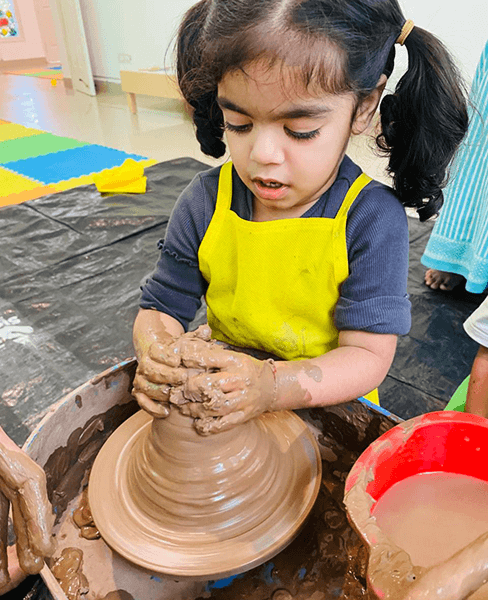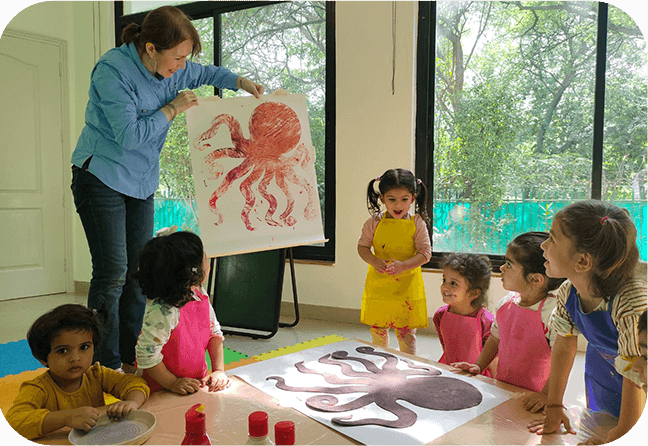The Tinker Lab child today
– a thriving adult of tomorrow
At Tinker Lab, we believe education should go beyond merely preparing children to be "school ready"; our mission is to make them "life ready" and equip them with more than just academic skills. An education system narrowly centred on rote learning and standardised testing overlooks the complexities of real life, leaving children underprepared to face its challenges.
We prioritise the development of emotional intelligence, fostering resilience, empathy, and strong character in every child. These qualities are the foundation of true success in life, enabling children to navigate the ups and downs of the world with grace and confidence. By nurturing these attributes, we empower the next generation of global citizens to build a better, more compassionate world.
At Tinker Lab, we are committed to cultivating minds and hearts, ensuring that our children are prepared for school and life in a world that desperately needs grounded, emotionally intelligent leaders.

What Sets Tinker Lab Apart: Evidence-Based Approach for 21st-Century Learners
At Tinker Lab, our philosophy and practices are grounded in decades of research and evidence from global studies and local contexts within India, Asia, and Commonwealth nations. We are committed to moving beyond traditional, top-down educational models to create a learning environment that truly nurtures and prepares children for life—not just for school. Here's how our unique approach is designed to achieve this:
Free Play:
The Power of Unstructured Exploration
At Tinker Lab, we recognize the profound impact of Free Play—unstructured, child-initiated exploration—on early childhood development. This approach allows children to engage deeply with materials and activities of their choosing, fostering autonomy and intrinsic motivation.
Free Play:
The Power of Unstructured Exploration
At Tinker Lab, we recognize the profound impact of Free Play—unstructured, child-initiated exploration—on early childhood development. This approach allows children to engage deeply with materials and activities of their choosing, fostering autonomy and intrinsic motivation.
Unlike adult-directed play, Free Play empowers children to explore, take risks, and learn at their own pace. Global research highlights that self-directed play cultivates essential skills such as creativity, problem-solving, and resilience, which are crucial for navigating the complexities of modern life. Studies by the National Council of Educational Research and Training (NCERT) emphasize the superiority of play-based learning over rote memorization. The Early Childhood Association (ECA) of India also advocates for play as a vital component of holistic child development.
Alignment with the National Education Policy (NEP) 2020: India's NEP 2020 underscores the importance of play-based and activity-based learning, especially in the foundational stages of education. The policy envisions a curriculum that integrates flexible, multilevel, play/activity-based learning to foster cognitive, affective, and psychomotor abilities in young children.
Our Commitment at Tinker Lab: At Tinker Lab, we have thoughtfully designed environments and carefully selected materials to support Free Play. This approach fosters joy, discovery, and the intrinsic satisfaction of mastering new skills independently, aligning with both global best practices and national educational policies.
CloseChild Led Learning:
Empowering children
At Tinker Lab, we embrace child-led learning, empowering children to steer their educational journeys based on their interests and curiosities. This approach fosters autonomy, intrinsic motivation, and a lifelong passion for discovery. Our educators act as facilitators...
Child Led Learning:
Empowering children
At Tinker Lab, we embrace child-led learning, empowering children to steer their educational journeys based on their interests and curiosities. This approach fosters autonomy, intrinsic motivation, and a lifelong passion for discovery. Our educators act as facilitators, crafting environments rich with opportunities for exploration and creativity, allowing each child to learn at their own pace. By honouring individual learning paths, we cultivate critical thinking, problem-solving skills, and emotional intelligence, equipping children to thrive in an ever-evolving world.
CloseOpen Learning Spaces:
Nature as a Classroom
Our classrooms extend beyond traditional walls into open, green spaces that invite children to learn and play in connection with nature. These environments are crucial for fostering physical, cognitive, and emotional development.
Open Learning Spaces:
Nature as a Classroom
Our classrooms extend beyond traditional walls into open, green spaces that invite children to learn and play in connection with nature. These environments are crucial for fostering physical, cognitive, and emotional development.
Global Evidence: The Natural Learning Initiative at North Carolina State University emphasises the importance of outdoor play and interaction with nature for children’s cognitive development and emotional well-being. Similarly, research from the American Academy of Pediatrics supports the idea that outdoor play enhances motor skills, creativity, and even reduces symptoms of attention deficit disorders.
Closer to Home: In India, the Centre for Environment Education (CEE) has documented the benefits of integrating green spaces into learning environments, particularly in urban areas where access to nature can be limited. Research from the Asian Development Bank (ADB) further supports the role of nature-based learning in promoting resilience and curiosity in children. At Tinker Lab, our green spaces are purposefully designed to provide these benefits, ensuring that every child can explore, discover, and grow in a nurturing environment.
CloseMixed-Age Group Classes:
Real-World Learning in Action
Our mixed-age classrooms reflect the diverse, collaborative nature of real-world social settings, where children of different ages learn and play together. This model promotes peer learning, mentorship, and a strong sense of community.
Mixed-Age Group Classes:
Real-World Learning in Action
Our mixed-age classrooms reflect the diverse, collaborative nature of real-world social settings, where children of different ages learn and play together. This model promotes peer learning, mentorship, and a strong sense of community.
Global Evidence: Studies from the Harvard Graduate School of Education have shown that mixed-age learning environments foster leadership and empathy in older children while younger children benefit from observing and interacting with their peers. This approach creates a dynamic, inclusive learning environment that mirrors the diversity of real-life social interactions.
Closer to Home: The Azim Premji Foundation in India has researched multi-grade classrooms, particularly in rural settings, and found that they enhance collaborative problem-solving and peer learning. This approach also encourages social cohesion, making it an invaluable model for diverse learning environments like Tinker Lab.
CloseInclusive Environment:
Diversity Strengthens Us All
Inclusivity is at the heart of our philosophy. At Tinker Lab, we welcome both neurotypical and neurodivergent children, creating an environment where early exposure to diverse peers fosters empathy, understanding, and mutual growth.
Inclusive Environment:
Diversity Strengthens Us All
Inclusivity is at the heart of our philosophy. At Tinker Lab, we welcome both neurotypical and neurodivergent children, creating an environment where early exposure to diverse peers fosters empathy, understanding, and mutual growth.
Global Evidence: Research from the National Institute for Early Education Research (NIEER) demonstrates that inclusive environments improve social skills and reduce prejudices among children. Inclusive classrooms are proven to foster empathy and deeper, more meaningful relationships.
Closer to Home: In India, the Right to Education (RTE) Act and programs like Sarva Shiksha Abhiyan (SSA) have made strides in promoting inclusive education. Studies by the Vidya Bhawan Society and Enabling Education Network (EENET) in South Asia highlight how inclusive settings benefit both neurotypical and neurodivergent learners by promoting mutual respect and understanding. At Tinker Lab, our inclusive approach builds a foundation of respect and cooperation from day one, ensuring that every child feels valued and supported.
CloseHigh Adult-Child Ratio:
Personalized Attention for Every Child
We maintain a high adult-child ratio to ensure that each child receives the individualized attention they need. This approach allows us to cater to the unique emotional and cognitive needs of every child, leading to better developmental outcomes.
High Adult-Child Ratio:
Personalized Attention for Every Child
We maintain a high adult-child ratio to ensure that each child receives the individualized attention they need. This approach allows us to cater to the unique emotional and cognitive needs of every child, leading to better developmental outcomes.
Global Evidence: Research from the National Association for the Education of Young Children (NAEYC) underscores the importance of low adult-child ratios, linking them to better language development, cognitive skills, and social interactions.
Closer to Home: The M.S. Swaminathan Research Foundation in India supports these findings, particularly in marginalized communities, where a higher adult-child ratio results in significant developmental gains. By maintaining a high adult-child ratio, Tinker Lab ensures that every child receives the personalized support they need to thrive.
CloseFacilitators, Not Teachers:
Guiding the Learning Journey
At Tinker Lab, our educators act as facilitators rather than traditional teachers. This approach allows children to take ownership of their learning journey, fostering independence, creativity, and critical thinking.
Facilitators, Not Teachers:
Guiding the Learning Journey
At Tinker Lab, our educators act as facilitators rather than traditional teachers. This approach allows children to take ownership of their learning journey, fostering independence, creativity, and critical thinking.
Global Evidence: The constructivist models pioneered by John Dewey and supported by contemporary research emphasize the role of educators as guides, not directors. Facilitators help children build their own understanding of the world, promoting deeper learning and problem-solving skills.
Closer to Home: The Tata Institute of Social Sciences (TISS) in India advocates for a facilitative approach in education, finding that it nurtures creativity and independent thinking. At Tinker Lab, our facilitators create a learning environment where children are encouraged to explore, discover, and grow at their own pace, supported by adults who respect their autonomy and individuality.
Teacher Training and Reflective Practices in early childhood: At Tinker Lab, we prioritize continuous teacher training and reflective practice to ensure our educators fully embrace and implement our vision. By engaging in ongoing professional development, teachers stay abreast of the latest educational methodologies and align their practices with our institution's goals. Reflective practice encourages educators to critically assess their teaching methods, fostering adaptability and responsiveness to each child's unique needs. This commitment to self-improvement and alignment with Tinker Lab's philosophy cultivates a cohesive learning environment where both teachers and students thrive.
Fostering Collaborative Partnerships: Parent – Educator - Child: At Tinker Lab, we prioritize a collaborative partnership among parents, educators, and children, recognizing that such alliances are vital for a child's holistic development. By fostering open communication and mutual respect, we create a supportive environment where children thrive, and parents feel valued and understood. Our approach is rooted in empathy, aiming to support parents in their journey without judgment, acknowledging their unique insights and experiences. This partnership not only enhances the child's learning experience but also empowers parents, reinforcing their role as integral contributors to their child's success.
CloseTeacher Training:
Reflective Practices in early childhood
At Tinker Lab, we prioritize continuous teacher training and reflective practice to ensure our educators fully embrace and implement our vision. By engaging in ongoing professional development, teachers stay abreast of the latest educational methodologies.
Teacher Training:
Reflective Practices in early childhood
At Tinker Lab, we prioritize continuous teacher training and reflective practice to ensure our educators fully embrace and implement our vision. By engaging in ongoing professional development, teachers stay abreast of the latest educational methodologies and align their practices with our institution's goals. Reflective practice encourages educators to critically assess their teaching methods, fostering adaptability and responsiveness to each child's unique needs. This commitment to self-improvement and alignment with Tinker Lab's philosophy cultivates a cohesive learning environment where both teachers and students thrive.
CloseFostering Collaborative Partnerships:
Parent – Educator - Child
At Tinker Lab, we prioritize a collaborative partnership among parents, educators, and children, recognizing that such alliances are vital for a child's holistic development.
Fostering Collaborative Partnerships:
Parent – Educator - Child
At Tinker Lab, we prioritize a collaborative partnership among parents, educators, and children, recognizing that such alliances are vital for a child's holistic development. By fostering open communication and mutual respect, we create a supportive environment where children thrive, and parents feel valued and understood. Our approach is rooted in empathy, aiming to support parents in their journey without judgment, acknowledging their unique insights and experiences. This partnership not only enhances the child's learning experience but also empowers parents, reinforcing their role as integral contributors to their child's success.
Close


